
Getting Political With Education
Last Updated
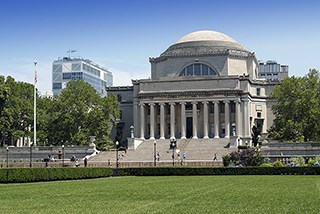 Former U.S. president Barack Obama graduated from Columbia University with a degree in political science before attending and graduating from Harvard Law School. Senator Bernie Sanders was a University of Chicago grad. George W. Bush went to Yale and then Harvard Business School. And Bill Clinton graduated from Georgetown University and Yale Law School.
Former U.S. president Barack Obama graduated from Columbia University with a degree in political science before attending and graduating from Harvard Law School. Senator Bernie Sanders was a University of Chicago grad. George W. Bush went to Yale and then Harvard Business School. And Bill Clinton graduated from Georgetown University and Yale Law School.
As you might expect, many of our nation's elected officials have highly recognizable universities on their resumes and have earned prestigious-sounding degrees. This led us to wonder—which schools have produced the most American presidents? And which have a reputation for sending their graduates to Congress?
To find out, we researched the educational backgrounds of every U.S. president and current members of Congress and compiled those data to form a larger picture of education in politics throughout American history and today.
Here's what we learned.
Seeking a Presidential Education
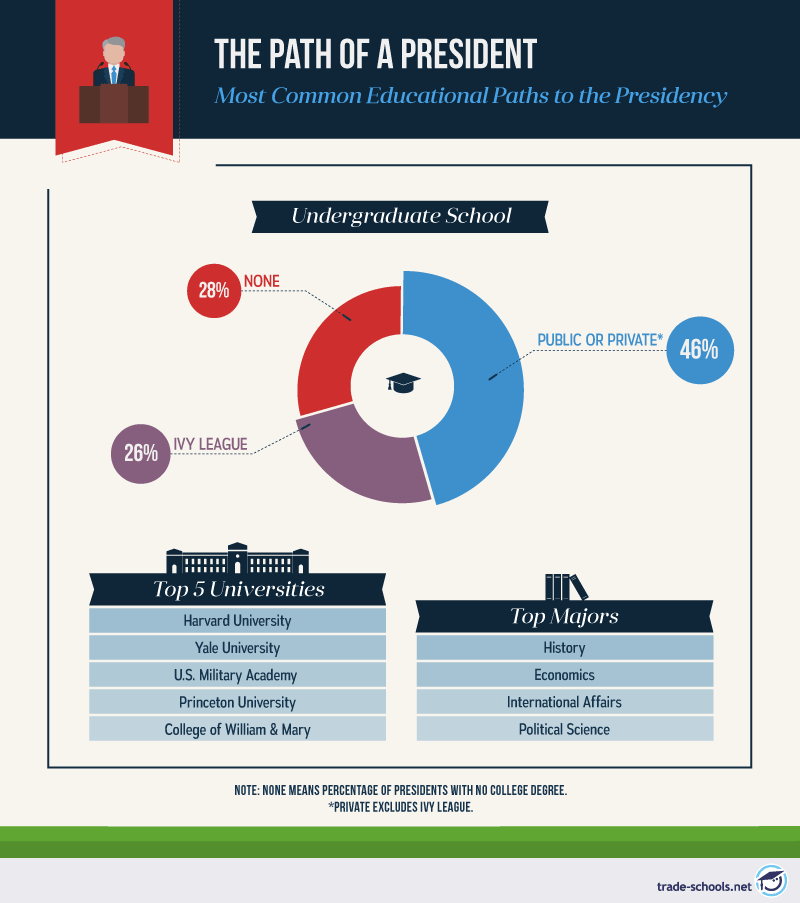
While you might assume most presidents have a degree from an Ivy League school, our findings show otherwise: Roughly 46 percent of presidents actually attended a public or non-Ivy League private university. And approximately 28 percent didn't even have a college education, including two presidents many consider to be contenders for the greatest president in U.S. history—Abraham Lincoln and George Washington. Washington did get his surveyor's license, but Lincoln didn't go to college at all.
However, despite the highest percentage of presidents attending a public or non-Ivy League private school for their higher education, three out of the top five universities are Ivy League institutions: Harvard University, Yale University, and Princeton University. Our findings also show that the most common presidential undergraduate degrees are in history, economics, international affairs, and political science.
Degrees in the White House
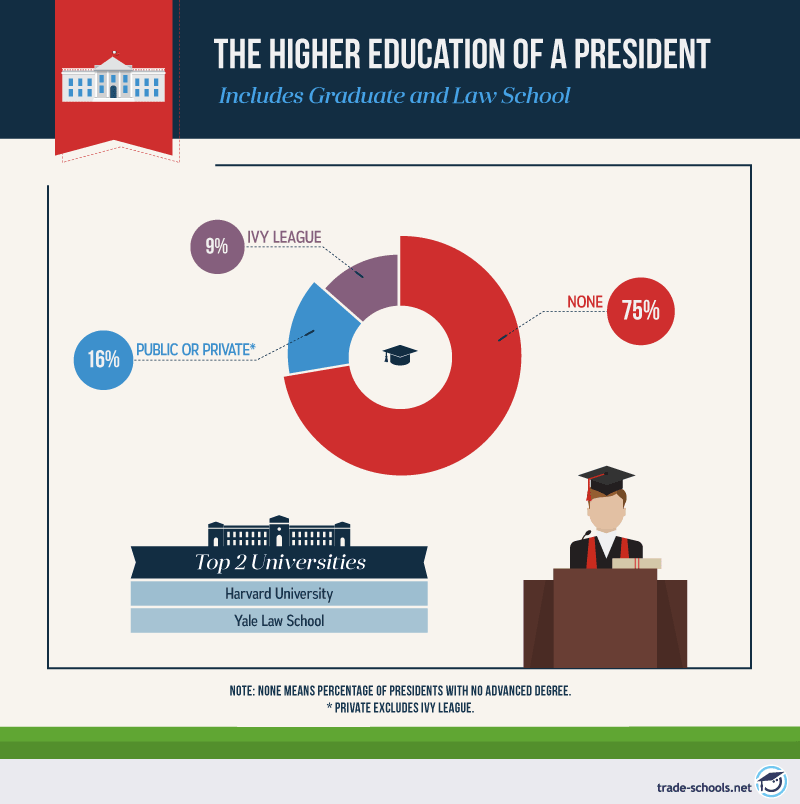
Most presidents have not gone on to get advanced degrees (nearly 75 percent), but of those who have, a slight majority attended public or non-Ivy League private universities (16 percent), while the remaining 9 percent went to Ivy League schools. Interestingly, every U.S. president who has gotten an advanced degree has gone to law school. Even the top universities for an advanced degree were Ivy League—Harvard and Yale.
(Will we ever elect a U.S. president with a background in the skilled trades or some other career area that doesn't require any kind of degree? Given the election surprises we've already witnessed, it's definitely possible.)
Common Congressional Educations
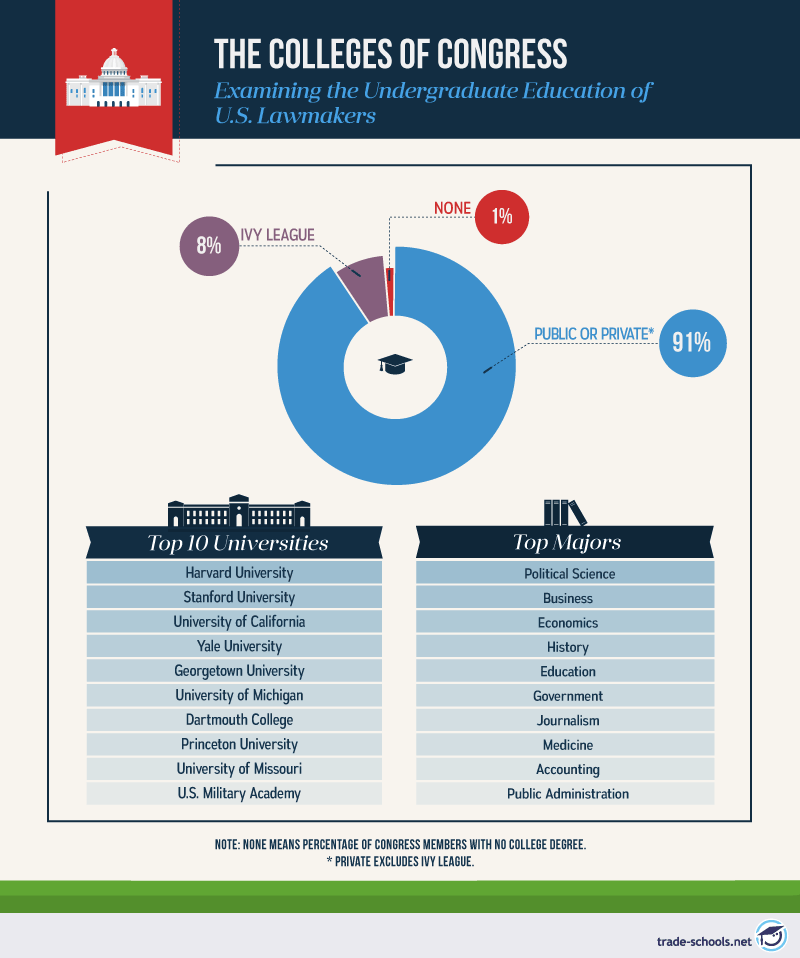
A college degree is not required to become a member of Congress, but it's often assumed. Looking at our current political leaders, only one percent of members in the Capitol did not earn an undergraduate degree. In the case of the 535 members of the 114th Congress, 20 members have no educational degree beyond a high school diploma.
At the same time, 91 percent received a college education at a public or non-Ivy League private institution, while 8 percent attended an Ivy League university. Of those who did receive an undergraduate degree, the most common universities were Harvard University, Stanford University, the University of California, and Yale University. And most received degrees in political science, business, economics, or history.
(With so much gridlock in Washington, D.C., maybe it's time to mix things up a little more. The nation's capital could probably use the fresh perspectives of new Congressional members with backgrounds in less traditional areas like technology or art and design.)
Advanced Degrees in Congress
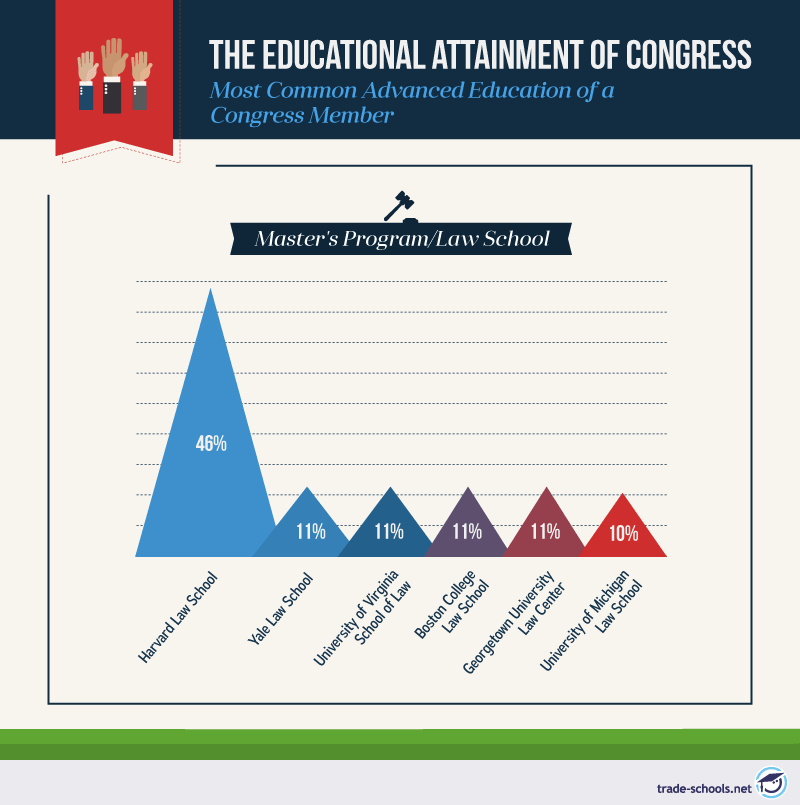
A large number of congressional members have also gone on to receive postgraduate degrees. In fact, according to the Congressional Research Service, 159 members of the House and 54 senators hold law degrees. Further, 23 representatives and one senator have doctoral degrees, while 22 members of the House and three senators have medical degrees.
The most popular schools for advanced degrees include Harvard Law School (46 percent), Yale Law School (11 percent), and the University of Virginia School of Law (11 percent).
Education Along Party Lines
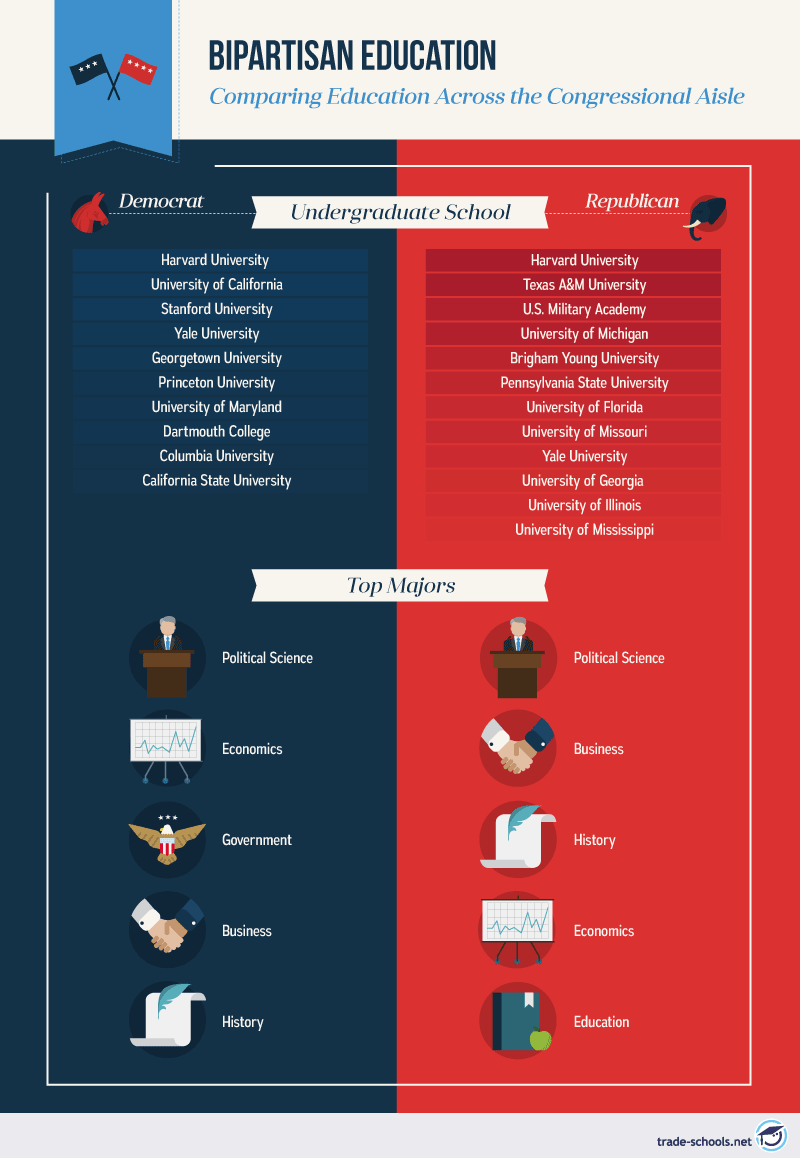
Divide the highly educated current U.S. Congress along party lines and you'll find that the college majors of our political representatives are very similar—no matter their party affiliation. Political science, government, economics, business, and history are top degrees on both sides of the aisle.
However, party lines do diverge when it comes to the top undergraduate schools these political minds attended. Regarding Ivy League, 19.4 percent of Democratic congressional members enrolled at Harvard, while only 11.3 percent of Republicans claimed the same. Other top universities for Democrats include the University of California, Stanford University, and Yale University. For Republicans, Texas A&M University, the U.S. Military Academy, and the University of Michigan follow Harvard in the rankings.
Notably, the top four undergraduate schools that Democratic lawmakers attended all reside in states that usually vote Democrat, while only one of the top schools that Republican congressional members attended typically shows up red come election time.
Education and the Productivity of Congress
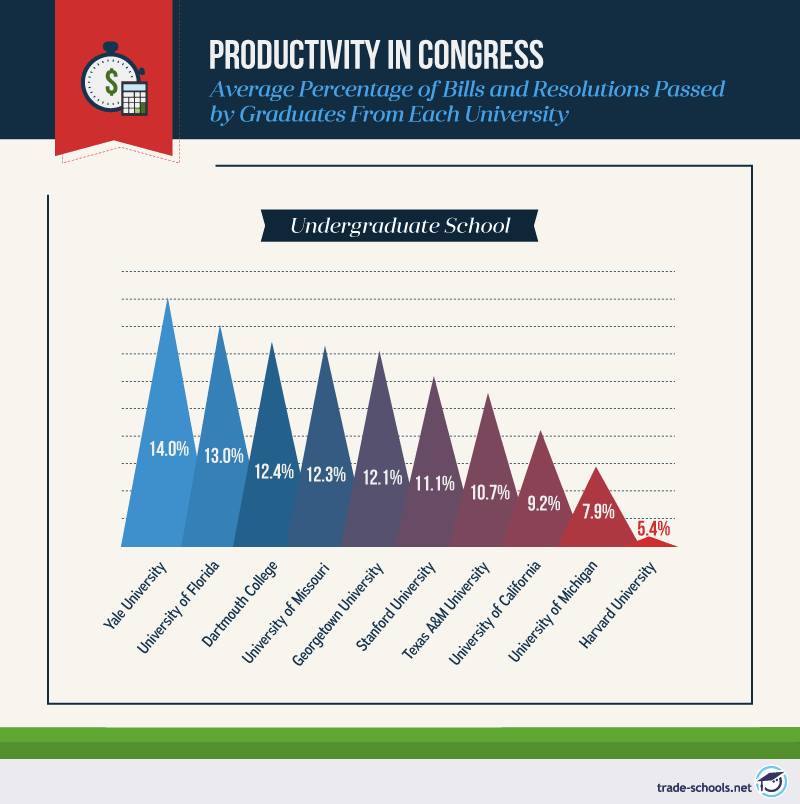
Does education correlate with productivity? Do highly educated candidates make better politicians? Are some universities more likely than others to turn out productive politicians?
When we measure the average percentage of bills passed and resolutions adopted by graduates from each university, Yale University may have the most productive Congress members—14 percent of successful bills and resolutions stemmed from members who attended this school. The University of Florida also produced some busy senators and representatives (13 percent), as did Dartmouth College (12.4 percent) and the University of Missouri (12.3 percent).
Graduates from Harvard University, on the other hand, seem to be the least productive regarding passing bills in the top 10, with only 5.4 percent of bills and resolutions making it successfully through Congress.
Comparing the Education of Presidential Candidates
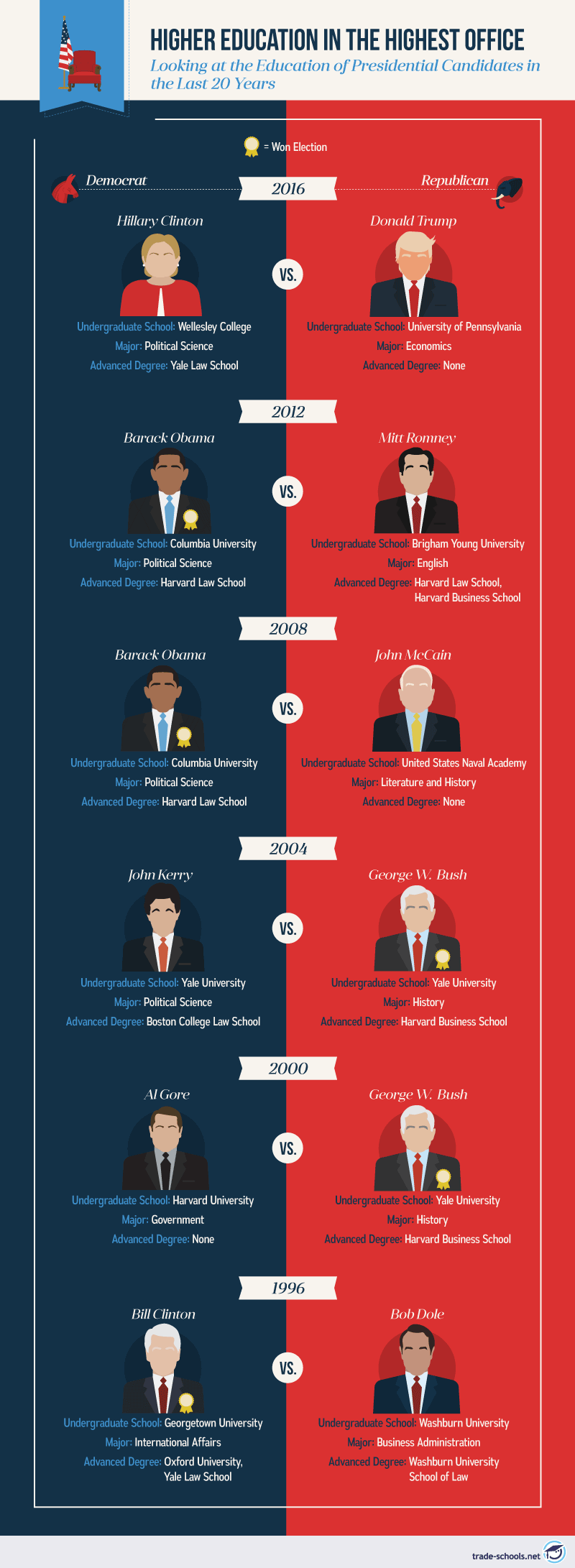
The final thing we looked at was the education of presidential candidates from the last 20 years. What we found was that all had undergraduate degrees, while a large majority pursued advanced education. John McCain, Al Gore, and Donald Trump were the only candidates who did not have an advanced degree.
John McCain sought an undergraduate education at the U.S. Naval Academy and received a degree in literature and history, while Donald Trump attended the University of Pennsylvania and got a degree in economics. Al Gore went to Harvard University for a degree in government.
Finally, Barack Obama, who served two terms as president, attended Columbia University for political science and received an advanced degree at Harvard Law School.
Conclusion
According to The New York Times, "only three countries—Canada, Israel, and Japan—have a more educated electorate" than the United States. It's been over 50 years since we elected a president without a college education, and Congress members without an undergraduate degree hardly ever make it into the ranks.
But does education correlate with productivity, public approval, and historical greatness? It's hard to say.
Lincoln and Washington both didn't earn degrees, but they are considered some of the greatest presidents in U.S. history. Still: Harvard University seems to be the school of choice for future politicians, and Yale University can lay claim to some of the most productive members of Congress.
While Barack Obama may have been one of the most polarizing presidents in modern history, according to a Gallup analysis, he's also highly educated. Former presidential candidate Hillary Clinton was another wildly controversial figure, and she has a law degree from Yale University. Even John F. Kennedy—a modern president with the highest approval rating across his presidency—was also a highly educated graduate of Harvard.
Methodology
To determine the productivity of each attended college of congress members, we used GovTrack.us and checked final statuses along with sponsors. Next, we cross-referenced the data with the university each sponsor attended.
Additional Sources
- United States House of Representatives, Directory of Representatives, website last visited on June 24, 2020.
- Biographical Directory of the United States Congress, website last visited on June 24, 2020.
- History, Art & Archives United States House of Representatives, website last visited on June 24, 2020.
- United States Senate, Senators, website last visited on June 24, 2020.
- History, U.S. Presidents, website last visited on June 24, 2020.
Fair Use Statement
Looking to educate your readers? Feel free to share our politically charged content. All we ask is that you link back to our politicians (or authors of this page) and use the content for noncommercial purposes only.
